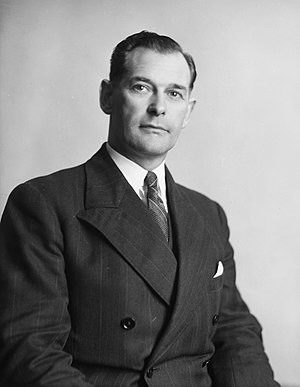Loren Allis
Loren Allis | |
|---|---|
 Official portrait of Allis in 1933. | |
| 1st President of Seketan | |
| In office 25 October 1924 – 11 December 1960 | |
| Preceded by | Position established |
| Succeeded by | Etyjen Pesan |
| Prime Minister of Seketan | |
| In office 10 November 1914 – 25 October 1924 | |
| Preceded by | Fjedor Meran |
| Succeeded by | Daffyd Behn |
| Chief of the Military-Civilian Council | |
| In office 19 August 1914 – 10 November 1918 | |
| Preceded by | Fjedor Meran |
| Succeeded by | Daffyd Behn |
| Leader of the Kjedorate Party | |
| In office 19 January 1914 – 25 October 1924 | |
| Personal details | |
| Born | October 14, 1882 Walybek, Seketan, Nelbec Empire |
| Died | December 11, 1960 (aged 78) Conelibek, Seketan |
| Resting place | Conelibek Government Cemetery |
| Nationality | Seketese |
| Political party | Kjedorate Party |
| Spouse | Sofya Bošje (m. 1912) |
| Children | Giogi Allis Loren Allis II |
| Education | University of North Conelibek |
Loren Adamesem Allis was a Seketese statesman who served as the longest-serving President of Seketan from 25 October 1924 until his death on 11 December 1960.
Advocating for the independence of Seketan from the Nelbec Empire, Allis led the Kjedorate Party to electoral success in the 1914 Seketese parliamentary election, later forming the Military-Civilian Council following the outbreak of World War I in the Nelborne. Following a revolution and civil war, Allis emerged as the founding president of the Second Seketese Republic. Disputes with Alquiya led to the Nelborne War whose negociated end preserved the territorial integrity of Seketan. Allis founded in the Third Seketese Republic in response to the Wilsk representation movement. Allis presided over the post-war prosperity of Seketan before he died in office, succeeded by his final prime minister Etyjen Pesan.
Allis's leadership of Seketan has had an enduring legacy on the Republic of Seketan. He led Seketan as an illiberal dominant-party democracy, developing a cult of personality. A staunch anti-communist, Allis established friendly relations with the West, especially France, but was criticized by some for his anti-democratic leadership. Celebrated as the father of the republic, he is also criticized for his role in endemic corruption within the Kjedorate regime.